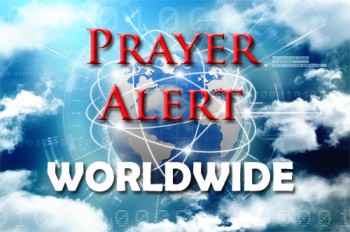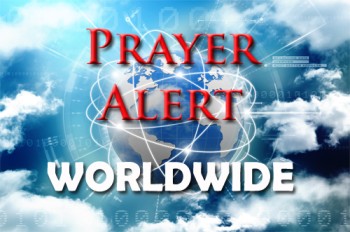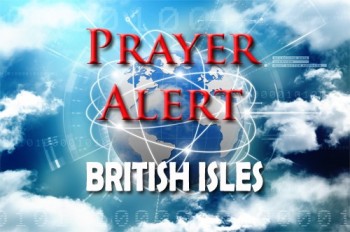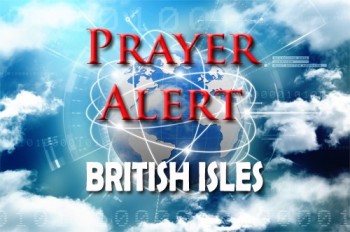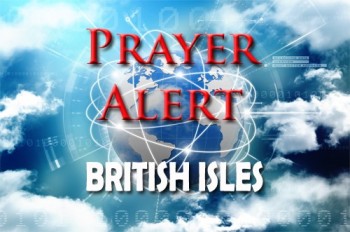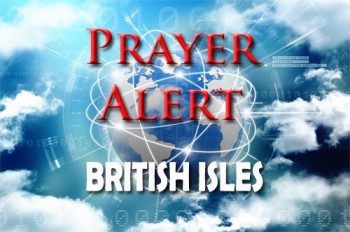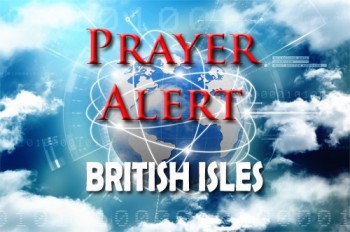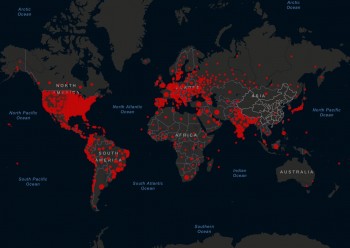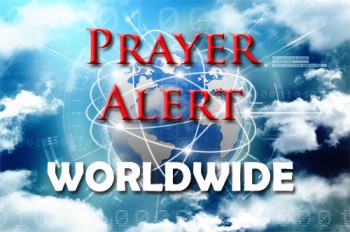Displaying items by tag: Covid19
Burma (Myanmar): ‘we work with tears’
A third Covid wave hit Myanmar amid ongoing violence from February’s coup. A ministry leader said, ‘This morning the wife of one of our workers cried on the phone, “My husband is struggling for breath. We need oxygen.” I asked our driver to go as soon as possible for a two-hour drive. The military frequently stop vehicles and confiscate oxygen tanks and medicines. Local missionaries drive for eight to ten hours to provide life-saving medical equipment and food aid. These days are mourning and weeping days. We are fighting the seen enemy, the military coup, and the unseen enemy, Covid. Many die by guns, bombs and Covid. Much violence is random. A pastor’s wife was killed in their house, a woman was killed while riding a motorbike toward the hospital. Since we have no government, no hospital, no government doctors and nurses, we search for private doctors and nurses that are available.’
She survived cancer and Covid at the same time
Geane Prado was diagnosed with bone marrow cancer. After a bone marrow transplant and a round of chemotherapy, doctors discovered Covid-19. Her condition deteriorated; she wrote goodbye letters to her family, and fully surrendered her life to God. While intubated, she endured pulmonary embolism, cardiac arrest, renal failure, and bacterial pneumonia. Doctors said she had 48 hours to live. Her children mobilized a massive prayer chain through WhatsApp, social media and praying at the hospital door. Across Brazil people joined in intercession. God answered them. Within a short time her fever vanished and her condition improved. Doctors called it ‘a miracle’ because it had nothing to do with medicine. After forty days Geane left the hospital not only healed from Covid, but also from cancer.
North Korea’s ‘ghost disease’
North Korea’s dictatorship says Covid-19 is not a problem, but the people secretly call it the ‘ghost disease.’ North Korea has reported no Covid cases and rejected millions of vaccines. However, reports on the ground tell a different story. Covid has been deadly, especially to the many North Koreans who are malnourished. Meanwhile Kim Jong-Un promises to expand his nuclear arsenal. Behind these issues are 25 million souls living and dying without the hope of Jesus. For a North Korean to have a chance to hear about that hope, it takes an act of God, and God is moving. North Koreans are being drawn to Jesus in daring and ingenious ways - through the underground Church, Christian radio broadcasts, and even covert balloon drops carrying Scripture. No nation is too closed for God to move. Ask God to deliver the people from the regime's indoctrination and lies and for truth to reign throughout the nation.
One million more Covid internet gamblers
Online betting rose significantly during the pandemic, the Gambling Commission has confirmed. Figures from the industry watchdog show a 12% rise in the number of adults gambling on the web between 2019 and 2020. Half of those did so using a mobile device, such as a smartphone. Matt Zarb-Cousin of Clean Up Gambling said, ‘Online gambling exploded in lockdown, with firms posting record profits. At least 60% come from those experiencing gambling problems, and online slots provide most of the revenue.’ He added, ‘Consumer protections, such as limits to stakes on slots, as on fixed-odds betting terminals, are badly needed in the gambling review.’ Researchers discovered that 21% of the 10,000 gambling premises in Britain are in the most deprived areas of the country, with only 2% in the least deprived areas.
NHS needs extra £10bn next year
Health bosses say that patients will be put at risk unless the NHS receives an extra £10bn next year to recover from the pandemic. A five-year settlement will see the funding increase by £33bn by 2023-24, but Covid has added to costs in a way that could not have been envisaged when Theresa May's government agreed the settlement in 2019. NHS leaders say the pandemic has led to pressures never seen in the history of the health service. Hospital layouts have had to be overhauled, services moved off site into new buildings, extra infection control procedures have been brought in, and the scale of sickness being seen means extra staff are needed to care for patients. At the same time, there is a growing backlog of traditional care such as hip and knee operations. Instead of budget growth by £4bn under the existing settlement, NHS leaders need almost £15bn.
Pandemic pinging = panic buying
Iceland said photographs of empty shelves in supermarkets, signs of panic buying, were isolated incidents. While there were ‘some availability issues’, they said their supply chains are resilient. M&S and other businesses said growing numbers of staff have been ‘pinged’ by the NHS Covid-19 app and they must self-isolate for 10 days. Businesses want people who have been double-vaccinated or have daily tests to be able to return to work. The British Retail Consortium said shops were facing increasing pressure as they try to keep shelves stocked with rising numbers of staff self-isolating. It said ministers needed to ‘act fast’ and allow fully-vaccinated retail workers or those who had tested negative for Covid to go to work. The Road Haulage Association said a shortage of 100,000 HGV drivers is disrupting supply chains as workers return to Europe following Brexit.
Wisdom and grace needed as singing is allowed
Sung worship in churches will be allowed from 19 July. Danny Webster of the Evangelical Alliance said that the prospect of worshipping together is exciting but will have many challenges. ‘We need to be very aware that we're in a context where cases are rising and, while the vaccine seems to be doing its job, churches may well want to be cautious and careful with how they proceed in the next few weeks. Every church will come to its own conclusions.’ Danny added, ‘There will be people who are vulnerable, people who are uncertain or anxious that aren't necessarily willing to come straight back into a church. Churches are going to have to act with a lot of wisdom and a lot of grace.’ Pray for an outpouring of wisdom on church leaders as they consider their congregation sizes, venue ventilation, and welfare of church members.
Covid: young people’s mental health
Covid-related pupil absence in England has hit a new high since students returned to school in March. Over 640,000 English pupils were not in school due to Covid last week; only 62,000 were confirmed or suspected Covid cases. Gavin Williamson plans to replace the present bubble system with a new increased testing regime so that pupils would only be sent home if they tested positive. Also the mental health impact of the pandemic could have lasting repercussions for young people leaving education to take their first steps on the career ladder, with over one in four 18- to 24-year-olds believing poor mental health will affect their ability to find a job. Research found that while the UK’s public health crisis has eased and the economy is recovering, over 20% of that age group are still reporting poor mental health. Pray for pupils in higher education to receive proactive support to thrive before any further damage is done.
Covid-19 Pandemic Prayer Update – July 2021
A July prayer report looking at the opportunities and challenges of vaccinations, Covid-19 Hot Spots and some suggested Prayer Pointers with links to resources:
As of 6th July, the total global figure for people infected by Covid-19 stood at 184.3 million according to Johns Hopkins University. In addition to this, the recorded number who have died totalled 3,986,701. After peaking in late April, cases declined throughout May and have remained steady in recent weeks
Covid-19 hot spots
Here are those countries / regions which are currently showing high levels of infection.
Brazil, India and Colombia currently have the highest case rates on a weekly basis, however these are declining relative to previous weeks. Indonesia has seen a 35% increase in cases over the last week. Other countries showing particular spikes include Spain, Myanmar and Russia whilst Africa recorded its record number of cases over the past week. There were 36,000 new infections reported per day, driven by a surge in South Africa.
Indonesia is suffering a serious rise in cases, its medical infrastructure is struggling to cope and is teetering on the brink of collapse as jammed hospitals turned away patients, forcing desperate families to hunt for oxygen tanks to treat the sick and dying at home. CNN reports that more than 60 people died in a hospital last weekend (3/4 July) after oxygen supplies nearly ran out, as the country battles a severe wave of covid-19 that authorities say is driven by the more infectious Delta variant. The world's fourth most populous nation is facing one of Asia's worst outbreaks, with a record high of 27,913 new cases reported on Saturday 3rd July. The islands of Bali and Java -- which includes the capital Jakarta -- went under emergency lockdown Saturday to curb the spread of the resurgent virus. In a statement, the Sardjito hospital on Java said 63 patients died between Saturday and early Sunday after it nearly exhausted its oxygen supplies. The hospital said it had sought more oxygen for days before the incident, but virus patients streaming in since Friday had pushed it beyond its capacity, consuming oxygen faster than expected.
The devastating wave of infections that recently overwhelmed India has passed however the full impact and devastation caused by this is still only now emerging. India remains the second worst-hit country in the world by the pandemic after the United States. The overall case count officially now stands at 30,619,932 cases, and 403,310 deaths although many fear it may be 5 or 6 times higher than this. Doctors have demanded additional protection after being subject to violence and assaults by frustrated and angry families whilst a lack of access to online learning, particularly for poorer girls, has led to research suggesting millions of girls could drop out of secondary school as a result of the pandemic.
Brazil continues to see great suffering in 2021. Thankfully, cases have decreased more rapidly over the last 2 weeks, although they still remain above levels seen last September. In total, Brazil has seen 18.79 million cases and 525,112 deaths.
Although there has been a slight improvement in recent days, as the pandemic recedes in much of the world, according to the World Health Organisation, Latin America has become the driver of global infections. Mid June, the region recorded nearly half of the world’s 10 200 daily covid-19 deaths. In Bolivia, Chile, and Uruguay, coronavirus cases are surging and hospitals are filling with younger patients aged 25-40 years old, said Carissa Etienne, director of WHO’s Latin American office, the Pan American Health organisation (PAHO). Bolivia, Colombia, and Paraguay all recently saw record covid-19 fatalities in the last fortnight. Venezuela reported 1300 new covid-19 infections and 18 deaths on 1 July. Hospital data show that the actual figures are at least four times higher than those published by the authoritarian government, say public health experts and doctors.
New waves and Variants
It seems that new variants are emerging monthly, each presenting new and concerning challenges. Last month much of the focus was on the Delta variant which now appears to be the dominant worldwide strain. Four major Australian cities went into a four-day "circuit-breaker" lockdown this week to try and stop it from spreading. Australia's Prime Minister, Scott Morrison, announced looser vaccination policies to try to get more people immunized before the variant could spread. Ireland delayed plans to resume indoor service in bars and restaurants and US officials urged Americans to get vaccinated to stop its spread. The World Health Organization says the Delta variant, also known as B.1.617.2, has spread to at least 85 countries since it was first identified in India last fall. At least half of the United States is seeing a rise in COVID-19 cases as the highly transmissible Indian 'Delta' variant continues to spread, according to a new analysis of Johns Hopkins University data.
It is feared that the delta variant is responsible for much of the new, third wave affecting Africa, but the picture is unclear in a number of countries as testing – let alone genomic sequencing – is sparse. Dr Ayoade Alakija, co-chair of the African Union’s Africa Vaccine Delivery Alliance, has said “We are in acute emergency mode – we need to prepare oxygen, field hospitals, health workers, declare humanitarian emergencies in countries where the systems are overwhelmed, and have surge capacity people coming in if needs be,” she said. She said that the pandemic in Africa was “silent”, with people suffering or dying at home . “In India we had the burning funeral pyres that the whole world looked at in horror,” she said. “This is like watching bodies slide under water, a silent mass drowning where people are reaching their hands up for help but no-one is watching and nobody can see.”
The latest variant to be highlighted by the World Health Organization, named Lambda, has now been found in at least 27 different countries. It is especially widespread across South America, having first appeared in Peru in August last year, and is accounting for more and more cases in these countries.
Having found its way to Europe, where there is already an ongoing battle against the Delta variant, due to lack of study it is still unclear how major a cause of concern it might be. It is not yet listed as a ‘variant of concern’, rather a ‘variant of interest’ by the WHO, meaning it has been identified as causing transmission or detected in multiple countries.
Some scientists fear that the Lamda variant that is ravaging Peru may be resistant to vaccines however there is no definitive data to support this yet.
This New York Times article provides a useful and detailed analysis of the nature and scientific understanding of variants.
Vaccines
“The global failure to share vaccines equitably is fueling a two-track pandemic that is now taking its toll on some of the world’s poorest and most vulnerable people,” said Tedros Adhanom Ghebreyesus, the director-general of the World Health Organization (WHO).
The emergence of variants has shone new light on the vaccination programmes as it is clear that without vaccination, the chain of transmission, hospitalisation and death will not be broken. Whilst many poor nations are crying out for vaccinations for the most vulnerable, some rich nations have begun vaccinating teenagers where the risk is very small.
African countries are also suffering from a crippling shortage of Covid vaccines. Only 15 million people, just 1.2 percent of the entire African population are fully vaccinated, according to the WHO.
The African Union special envoy tasked with leading efforts to procure Covid-19 vaccines for the continent has blasted Europe on Thursday, saying that “not one dose, not one vial, has left a European factory for Africa”. Strive Masiyiwa took aim at the global scheme COVAX which was run by various organisations such as WHO and UN that was meant to distribute vaccines to low- and middle-income countries.
Masiyiwa said COVAX had promised to deliver 700 million vaccine doses to Africa by December. But at mid-year, Africa has received just 65 million doses overall. Less than 50 million doses via COVAX have arrived.
Moreover, even those Africans who have been fully vaccinated may not be able to travel freely in a post-pandemic world. European Union has recently imposed restrictions on people vaccinated with Covishield, the Indian-produced version of the EU-accepted AstraZeneca vaccine. Dr Ayoade Alakija is the co-chair of the African Union’s Africa Vaccine Delivery Alliance told BBC that if the decision is confirmed, that would amount to what she calls “vaccine-apartheid”. “What it feels like there is a two-tier vaccine system in this new world… where we are living in one world, the pandemic is almost over, in another world the pandemic is quite frankly beginning.”
Latin America and the Caribbean continue to be hit by increasing numbers of Covid-19 infections and deaths, highlighting the stark global inequalities in access to vaccines, officials from the World Health Organization warned.
At a time “when we are seeing some reprieve from the virus in countries in the Northern Hemisphere,” Carissa Etienne, the director of the W.H.O.’s Pan American Health Organization, said at a news conference that for most countries in the Southern Hemisphere, “the end remains a distant future.”
Only one person in 10 has been fully vaccinated against Covid-19 in Latin America and the Caribbean, she added, calling it an “unacceptable situation.”
“Access to Covid-19 vaccines shouldn’t be a privilege for a few but a right we all share,” Dr. Etienne said.
Current figures show that 3.25 vaccination does have been administered, 895 million people are fully vaccinated, representing 11.5% of the world population.
Let’s Pray… Let us continue to declare that the novel coronavirus is defeated by the blood of Jesus.
We pray for divine intervention and for God's name to be glorified even as each nation and government tries its best to prevent or control the emergence of new waves of infection and finally arrest this epidemic.
We pray that individuals, leaders and nations focus on the needs of others rather than themselves, and that cooperation and compassion lie at the heart of the world’s response to the crisis.
We pray for our scientists. In particular we pray for those assessing and communicating risks associated with vaccines, that they be filled with wisdom and understanding. We pray too for those investigating, sequencing and analysing new variants.
We pray especially for the nation of Indonesia. We stand with our brothers and sisters who are living amidst this uncertainty. We pray in particular for those providing medical support in the most difficult of times.
We release wisdom, skill, and integrity upon our leaders, particularly as they grapple with the complexities, challenges and many voices that seek to influence them.
We pray that leaders and nations will see their moral duty to the world’s poorest and most vulnerable people and back this up with action not just words.
We pray for protection, wisdom and strength, for those working to bring treatment and comfort to the sick and their families.
We pray for individuals struggling to decide whether to receive the vaccine. We ask that their fears be settled and that the information they receive be truthful and honest.
We pray special grace and help for the vulnerable and lesser-developed nations.
We pray for a safe, effective, and affordable vaccine to be released soonest and the continued development of a range of vaccines to supply the whole world
We continue to release faith, hope, and love over the peoples of the world. May the Church seize this opportune time to manifest Jesus our Lord and Savior to those who are seeking answers and peace.
Japan: Covid-wary Olympics
A month before the Olympics opening ceremony, many Japanese people remain resolutely opposed to the Games, amid fears that the influx of athletes, sport officials and journalists could worsen the continuing Covid outbreak in Tokyo and across the country. The International Olympic Committee (IOC) and organisers are steadfast in their resolve to continue with the Games as anti-virus measures remain in place; they promise stringent protocols will prevent 93,000 visitors from worsening Japan’s outbreak. But questions still outnumber answers. Doctors and healthcare workers have the strongest opposition voices – an infection surge could overwhelm healthcare systems. ‘Front-line medical workers are being treated as disposable,’ said a 27-year-old nurse in Tokyo.Another factor fuelling public opposition is the sluggish pace of Japan’s vaccine rollout. A former Olympic athlete said the safety of people is not considered the priority. Instead, the IOC’s own interests are being considered the priority.
